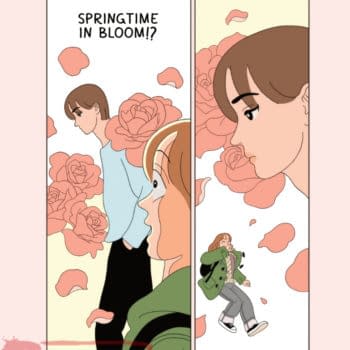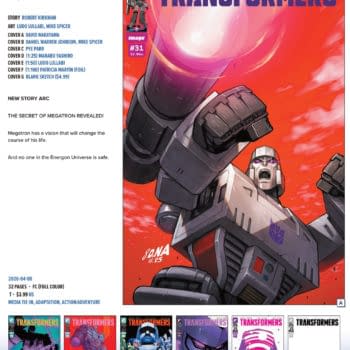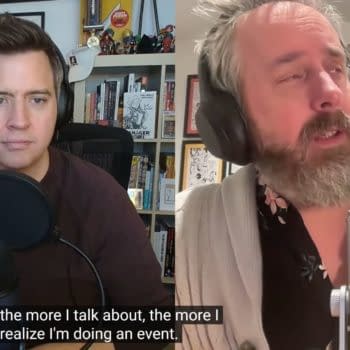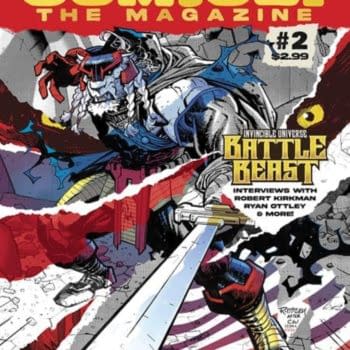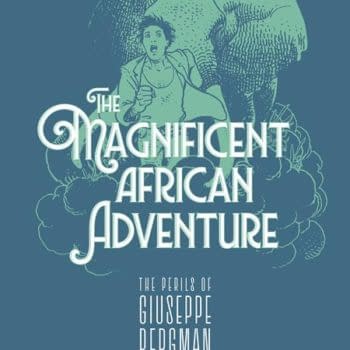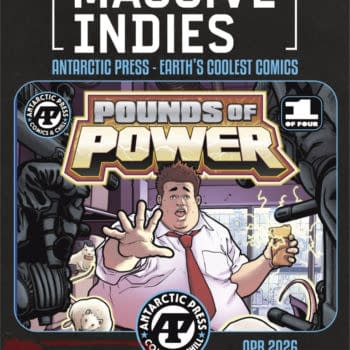Posted in: Comics | Tagged: bernie wrightson, big man plans, dark horse comics, entertainment, eric powell, fcbd, image comics, Mark Buckingham, the goon, The Goon: Occasion of Revenge, The Goon: Once Upon a Hard Time, vampirella
It's A Battle For The Goon's Soul In 2015 – Eric Powell In The Bleeding Cool Interview
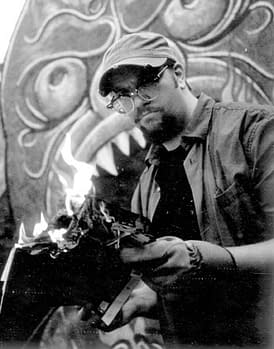
Powell's artwork has never been so imposing, each panel designed it seems for emotional impact. But "Occasion of Revenge" is in many ways the set up for a final showdown where the fate of the Goon's soul hangs in the balance. He's never been more surrounded by corruption or more driven by his foes into a net of personal rage. Powell promises here that the Goon will return after 2015's "Once Upon a Hard Time", but things will be very different. It all depends, of course, on the choices made in this crucial storyline.
Eric Powell talks with us here about his history in comics, the development of "Occasion of Revenge" in his own mind and on paper, and teases some of the key questions that will be posed in "Once Upon a Hard Time". But he also discusses at length the need for diversity in comics, the strengths of the creator-owned movement, and why this may be the best era in comics that readers have yet seen.

Eric Powell: I had my heart set on it since about Junior High. I was always drawing. I had a notebook and I was drawing pictures in it, then I would write little short stories to go along with them. And then I rediscovered comics through a friend and I thought, "This is exactly what I should be doing. Writing and drawing. This is what I should do". So I had my heart set on it for a long time. It didn't really seem realistic though, but I guess I was stubborn enough not to quit. I was lucky enough that it started to actually open some doors and I got my foot in the industry.
HMS: What sort of things were you doing when you first started being published?
EP: The first job I ever got was through Tom Sniegoski who was writing Vampirella at the time. I'm a big Bernie Wrightson fan, and he actually came to a store in Nashville to do a signing. So, I wasn't going to miss that chance. I took my portfolio with me and went to the signing and asked him to take a look. Tom loves retelling the story, and he says that I was very dejected and flopped my portfolio down in front of him and said, "Do you think I have a chance?" It was a really encouraging day because not only was one of my artistic heroes, Bernie Wrightson, telling me, "Wow. This is really good stuff", but also Tom gave me his card and said, "Hey, let's talk. Maybe we could get some projects going". It wasn't very long after that that he lined something up for us doing a Razor comic. There was a character in the 90's called Razor, who went along with the "bad girl" books at the time. That was actually my first paid comic work, a three or four issue story of Razor with Tom.
HMS: And you were the artist on that? Or writing as well.
EP: I was the artist.
HMS: Do you ever look back on your earliest comic art and have a critical view of it now? Do you still like it?
EP: Oh, yeah. I look back on the stuff I did yesterday and am embarrassed by it. I'm still not happy with anything I've done as a whole. I keep going, thinking, "One day I'm going to get that book, and do it and be happy with it". But that hasn't happened yet. [Laughter] I think it keeps me motivated, though. I'm still trying to do that book that I'll be pleased with.
HMS: Geez. I've heard that from a few people, but it's tough to hear that as a reader, because obviously your readers think your work is great and are really obsessed with it. Especially, the nuances of your art are so unusual compared to what a lot of other people do. You've won so many Eisner Awards for your art, as well.
EP: I had this conversation with Mark Buckingham a few weeks back. I was voicing some frustration with my work and we were talking about it. How when we put something out there, everyone else looks at and sees the good parts, but from the creator's point of view, we are only seeing what we didn't get right with it. It's not a matter of judging anyone's taste. I think to become a competent artist, you have to be super-critical of yourself, so you're always going to fixate on those things that need a little more work. Mark nailed it when he said, "You're always going to look at everything and see what you got wrong".
HMS: And the ways in which it falls short from what you envisaged in your mind?
EP: Yes.

EP: I think that it's because The Goon is not a "concept book". The best example I can think of as a really great concept book is 30 Days of Night. Because it's such a great idea: Vampires take over an Alaskan town because for 30 days, there's no daylight. That's a great concept. Maintaining that for a long time is difficult because it's a great central concept, but how do you derive more stories from that? Steve Niles did a good job of turning that into a franchise, but I don't think I could have. It would have been a one and done story. Whereas Goon is just two guys, and that's pretty much it.
It's the idea of taking these two friends, the Goon and Frankie, and they are interesting characters, the kind of guys you would meet in a bar, with one kind of stoic and the other one all mouth, and asking, "How do these guys react in different situations?" That was one of my main goals when I created the book, to have something where I could tell any kind of story I wanted to. I could do comedy, tragedy, science fiction, horror, crime, and all that kind of stuff. If I have an idea for a story, I ask, "How would the Goon and Frankie react to this situation?"
So, it really plugs in easily to any kind of thing I want to do. It's really that pulp hero kind of approach, where if you come up with a strong character, it's just dropping them in a situation. It's not that this story has a beginning, middle, and an end, and then I'm trying to come up with other stories based off of that. It's just, "Here's an idea I have for a story. Let's drop these guys in it and let them run wild". I think that's been the key to the creative longevity that I've had with it.
HMS: I can definitely pick up on what you're saying from observing other books that have managed to last a long time. When stories are so purely character-driven, when it becomes about the cult of the character for the reader, then it lasts if the creator wants it to. But it's also about a mood or an attitude that they bring with them, I think. So, why is the world of The Goon something of a horror world? Though I know there's a lot of comedy in there as well.
EP: A lot of it is that The Goon is a blender of everything that I like. I like horror and noir stuff. And also a lot of it is about things that I like to draw. I love that Depression era look. While I don't give the book a specific time period, it's heavily influenced by that feel. It's an amalgam of stuff that I either care for as a subject, or I like to draw.
HMS: I guess over time, other characters have developed around these two, the Goon and Frankie, like a sort of ecosystem, growing outward. Is that necessary for a long-running story, or is that just that you're discovering new things you want to talk about along the way?
EP: I don't go into anything with a very rigid structure as far as The Goon goes. If I throw a character in there just because it's part of the story, and then I end up liking that character, I keep bringing them back. The best example I can think of is Willie Nagle, the zombie who hangs around in the bar. It was meant to be a throwaway joke for one issue, where I was thinking, "There should be a zombie trying to pass himself off as human in the bar one day. And the Goon beats the crap out of him and kicks him out". But I liked the exchange so much that I brought him back the next issue, and the Goon does the same thing. Then I brought him back again, and the Goon kind of says, "Whatever. If you're going to keep coming back–". And then he just became a reoccurring character. I don't go into it thinking, "I now have this character and I have to build him into the plotline this way". It's more about letting the characters pop up and evolve organically.
HMS: So, depending on your mood and how you're feeling about a particular story, characters might fade out of that particular story, but come back in another story if it occurs to you that you'd like to include them?
EP: Yes.
HMS: Willie is the one who in "Occasion of Revenge" appears, and we learn about his backstory, and why he has revenge in his own history? That brings me back to Occasion of Revenge. It's a pretty dark story set in an already somewhat dark world.
It's a study of revenge, almost in a psychological way. It seems to me that it's kind of about tipping points and applying pressure, finding the fault line when someone could potentially crack and become entirely consumed by revenge or by hate. Why is it your study? Why is it the subject of this storyline?
EP: The kind of mythology that evolved in The Goon, and this wasn't something I set out to do, but it evolved this way, started to become about the curse in this town. I noticed early on that all the stories I was coming out with, even the humorous ones, were funny, but none of them were upbeat. They were funny, but sometimes in a cruel way. And some of the stories were sad. Then it occurred to me that the place the characters are in is cursed. No one there is going to have a happy ending. I started building up to this conclusion that the zombie priest and his coven of witches are coming to feed off of that energy. The revenge idea actually came from a line I overheard from Meryl Streep in a Shakespeare play, The Taming of the Shrew. She says, "Speak not to me. I will go weep until I can find an occasion of revenge".
That line really struck me, and it was the acorn that started growing this idea of doing a series totally focused on revenge. Because vengeance is the basis of noir stories. There's always some kind of vengeance going on. I wondered, "What if I took this idea to miniseries format, and each issue was focused on a different tale of revenge, but it was building up to this dark thing that the witches were going to use to manipulate the Goon?" That's where the idea came from, but I deal with the darker aspect of revenge a lot.
I looked up a lot of information on revenge when I was doing this, and there's a Buddhist quote that says, basically, that vengeance is an acid that burns the container more than the intended victim. I wanted to wrap that into the curse of the town, the way that vengeance poisons it even more and feeds into the curse of that place. That whole theme of vengeance corrupting leads into the next miniseries, which is called "Once Upon a Hard Time". Then, it's explained even more how vengeance wraps into the curse and why the witches are even more obsessed with it.

EP: I think the only "decent" character who ever comes out of The Goon is the Goon's Aunt Kizzie. She is the moral center of the entire series, and she's the only "good" character in the series, the only decent person. The Goon is not "good" because he's been corrupted by her murder, but his heart is still attached to her and he tries to do the right things. I wanted those stories of vengeance to make sense and be believable. I think a lot of vengeance comes out of hurt. Kid Gargantuan's mother was treated horribly in that story, but she let that corrupt her, and ended up putting that onto her son, which curses him. I wanted everyone to have a reason to be vengeful, but I also wanted to show that even if you have a reason, it's still corrupting you.
HMS: It's like something going septic or spreading in a viral way. It's interesting the way it is passed around and builds between the characters. And of course, the Coven are encouraging those connections to pass it along.
EP: Yes, the witches are there for no other purpose than to make everyone even more miserable and feed the curse, which will then, in turn, feed them.
HMS: Now we're venturing into "be careful of spoilers territory", but regarding "Once Upon a Hard Time", this is going to be the aftermath of the game-changing elements at the end of "Occasion of Revenge". You've clearly stated in the promo for the series that this will be real change, and not cyclical with ret-conning like superhero stories. For you, how is "Once Upon a Hard Time" a culmination of all these years of work on The Goon?
EP: Yes, a lot of things will be concluded. Not to give too much away, but at the end of "Once Upon a Hard Time", the readers who have followed the book all along will get a lot of "Wow". Because there are going to be some pretty major shifts. To be vague, it's definitely true that after "Occasion of Revenge" things turn really dark. It's a battle for the Goon's soul, pretty much. He's going to have to decided which person he is. He goes down a really dark path at the beginning of this miniseries and has to decide if he's this brutal street-thug type of guy or if he's the sort of person who his aunt wanted him to be. Where we leave him at the end of "Occasion of Revenge", he's definitely losing that battle and choosing the darker path. Well, he may not be "choosing", but he's definitely following it, letting his situation get the better of him.
HMS: Well, he's being infected by revenge pretty heavily. It seems like everything bad going on is flowing back toward him. Maybe you planned it this way, but it seems like everything seems to circle back to him away from the other characters and we begin to realize his importance in the middle of all this.
EP: Yes. He is important to the town, probably more than he or anyone there realizes. He's chosen to stay in this place even though he knows that it is cursed and he won't find happiness there. He chose to stay there to try to help the people there or be some kind of positive force there. That's the thing that the Coven wants to eliminate. If they can wrap him up in this cycle of revenge, it definitely becomes something working in their favor.
HMS: Is it about assailing or questioning what makes him different from these other cursed beings? Is it about whether he's going to become subsumed by that environment, and therefore lose his autonomy from the curse?
EP: Well, I think that's the road he's headed down now. I think he's becoming part of the problem rather than the solution. That's the core internal battle for him in "Once Upon a Hard Time". Is he going to continue to follow that path and become part of the problem, part of this curse? Or is he actually going to break out of it? Where we leave him at "Occasion of Revenge", he's not doing such a great job.
HMS: Is that why it's kind of the end point of so many years of work, because you're delving so deeply into his character and motivation, focusing on that key point of his personality?
EP: I don't know. I don't think that was intentional. When I worked on "Chinatown", I wanted to show that it was not just a funny, goofy book. I wanted to give the character some depth. I think that the way that the ideas for the stories have been developing, the better stories seem to be the ones where there is a psychological conflict or something going on within the character. It's not just, "Hey, I'm going to go punch this monster". Adding some internal conflict with all of the external conflict that's going on just builds a better story, I think.
HMS: Will there be more Goon after "Once Upon a Hard Time"?
EP: Yes, but it will be different. That's about as unspoilery as I can get.
HMS: Fans will be relieved to hear that. To shift focus a little, how has your art process changed over time? What is your normal composition process?
EP: It's changed quite a bit. It's constantly evolving. We mentioned before not being happy with the end product. I keep trying different techniques to just experiment and keep myself interested in the art. For the most part, I don't really write full script because I'm drawing it and I don't have to tell myself where each little detail is supposed to go. I know where it's heading. For my scripts, I don't break them down panel by panel. I break them down page by page. Then I write all the dialog. From there I just do thumbnails, then transfer them to the page and work from there.
HMS: So you do everything by hand?
EP: For the most part. I used to letter everything by hand. Up until "Occasion of Revenge", I was lettering on the board, and then I switched to doing it digitally because it allowed me to be a little more graphic with the page design. I really fought it because I think that since you're looking at comic book art, you should be able to read it. But I came to the conclusion that it's really about what's on the printed page, not about one original piece of art. I switched over and started doing all my lettering digitally so I could put more of a graphic impact on it.
HMS: Well, you're also just one person doing all these tasks.
EP: Yeah. Also, some of the coloring I do on the board and some of it is digital. I'm trying to use the computer as a complementary tool and not something I'm relying on because I do want it to have a hand-drawn feel to it. I don't want it to be too crisp. I don't want it to look machine-made. I want it to look like someone sat down with a pencil and actually drew it.
HMS: Is there any particular reason why you are more inclined toward the pencil line versus inking?
EP: I don't know. As an artist, I just enjoy it more. I really love a pencil. And if I'm looking at someone else's artwork, I always like their sketchbook stuff more than their polished, finished, clean line. I want to see the scribbles. There's something visceral about a pencil. You see someone laying down pencil, and they're not caring about every little line. It's almost the difference between someone playing something technical on a guitar and someone playing Punk Rock. Here's some perfectly polished thing, and here's someone just banging away. It's not perfect, it's not flawless, but there's some kind of energy to it. For myself, when I'm drawing, there's something about pencil that I like. I think sometime in the near future, I'm just going to do a book purely in pencil.
HMS: Wow. That would be great. I know it's sometimes difficult for people to receive this, but would it surprise you to learn that you've influenced people in that? I've been seeing promising artists breaking out right now starting to do things purely in pencil and then using digital enhancement rather than inking. It's becoming more of a thing now, and your name has come up. I think you've influenced people.
EP: Really? I see people doing some stuff, and I think, "Oh, that's cool", but I never think that people are doing it because they've seen me do it. That's cool and extremely flattering, but unless I see someone doing a character that looks exactly like the Goon, I never think that. This is one of the best times artistically in comics, I think. You look at the cover art, and I think today's cover art is probably the best that's ever been done. From a standpoint of, for one, really good technical artists, and two, there's actually a sense of real graphic design now. Where it isn't just, "Here's a guy jumping off a rooftop. And here's the logo. I'll put some flashy text on it telling you something's happening in this book".
No, these artists are actually bringing a graphic design sense to these covers now and combining it with great artistic skill. Honestly, it makes me a little nervous. When am I going to become boring and old? We have so many great creators coming out now. Also, we have people from all walks of life getting into comics and becoming comic book artists. When I was trying to get in, it was a bunch of bearded fat white guys. Now you actually see women and minorities. There are no boundaries now, and all kinds of influences coming in. It's a really awesome time in comics, I feel.
HMS: To go back for a moment to what you said about not thinking you influence people. That's fair enough, but I think one of the things that can't be underestimated is that just seeing someone else doing something that breaks with prevailing tradition can make a difference for another artist.
Comic book tradition has that heavy inking from the 60s onward. These heavy, dark lines. And just seeing someone doing something different, consistently over time, is going to give people the idea that they have more freedom to experiment. That's a really great contribution to developing different types of comic art that you've helped put forward.
But regarding the comic art right now, I was going to ask you what you think the pros and cons are of working in comics right now. With the indie comics movement, and where comics are right now, what are some other things you think are positive or negative?
EP: Well, things have changed really quickly in a short amount of time. I started bitching and complaining about the need for creator-owned comics four or five years ago. For the most part, it was embraced, but there was some shouting down of that stuff. I was talking then about the fact that we were paying too much attention to Marvel and DC, and we needed to diversify if we wanted to grow the industry. I make a lot of jokes in The Goon like, "Superheroes suck" and all that and I poke fun at them. I poke fun at them because it's easy to poke fun at. I'm not begrudging anyone's entertainment. If you find something that makes you happy, and takes your mind off the not so positive parts of your life awhile, and that's Wolverine and Batman, more power to you. You go out and get as much Wolverine and Batman as you can get.
But my point is, why are we only paying attention, as an industry, to those two companies? If we diversify, and make the audience broader, we bring in different types of people who maybe don't want to read a superhero comic. If you get them into your comic store, and maybe sell them something else, we're only building our industry. A lot of people didn't want to hear that then, and they still don't want to hear that, and that confuses me. Look at the industry from about five years ago to now, and you've got stuff like Saga selling crazy numbers, and of course The Walking Dead, though it has a TV show so is a different type of animal. But it's still a creator-owned comic selling like crazy.
You've got so many creator-owned comics that are these huge hits, and that is really encouraging to me. It shows me that the industry is starting to make a shift. Sure, let's hold onto our flagship books that have built up this industry since the 30s. That's awesome. But let's also start looking toward the future and creating new characters who may be legacy characters down the road. It seems like a really interesting, great time in comics. Everyone seems to be pretty excited. For the most part, creators and people I talk to are just excited about what they are doing, and it's really great that the artists who are coming along are really full of enthusiasm. The diversity of the crowd, with different genders, ethnicities, and sexual orientations form a great mix of creators, and it's really awesome to see.
HMS: And they, for the most part, are having a lot more creative freedom with their comics and in what they are presenting.
EP: That's the great thing about comics is that, especially with creator-owned comics, it's your voice. If you're making a film, you're going to have twenty Hollywood executives who are in no way creatively inclined giving you notes and telling you what to do. No one is telling you what to do with a comic. That's your voice, you're putting it out on paper, and that's it. And that's a really great thing.

EP: It is. We almost destroyed the comic book industry, and that's almost happened several times because of the industry being narrow of vision, and not diversifying itself. No one goes to the movies and says, "I'm going to see that movie by Paramount". They say, "I want to go see this comedy, horror film, or action movie". You can't go to a movie theater and just see James Bond movies. That's not all that you're going to see there. The comic book industry is weird in that it focused all its energy on two superhero companies, and that's all a lot of the shops would order. No movie distributor or theater is saying, "I'm just going to go with Paramount and that's it". Comics are the only entertainment industry that I can think of that's like that. Where's there a monopoly on superheroes that a certain company has and that's all that people are going to pay attention to.
HMS: Are there any upcoming projects that you'd like to talk about aside from "Once Upon a Hard Time".
EP: I have one secret project that I'm writing for an amazing artist. I can't wait for it to be announced, but it's still under wraps right now. And we just announced my first book with Image Comics, Big Man Plans. I'm drawing and co-writing that with my friend Tim Wiesch. It comes out in March. There are going to be a lot of Eric Powell books on the shelves in 2015. I hope nobody gets sick of me!

In today's recent news, Diamond's Free Comic Book Day "Gold" offerings have been released, and within those announcements we find a substantial Goon feature by Powell from Dark Horse alongside Fight Club and The Strain. So we will really be seeing a lot of Eric Powell in 2015!
Here's the solicit image for Dark Horse's FCBD issue, featuring the Goon in "Colonel Nosferatu's Underground Soiree":













